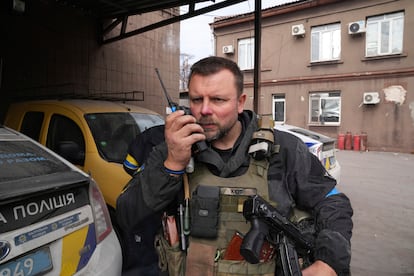A year after Mariupol’s fall, Azovstal survivor recalls surrender with pain and a sense of purpose
A Mariupol police officer who was among the last defenders to surrender from the Azovstal steel mill is among those to mark a year since they surrendered on orders of the Ukrainian president

The group are treated as heroes across Ukraine for drawing Russian forces away from the attack elsewhere in the country and for changing the course of the war.
Mikhailo Vershinin was a shadow of the burly Mariupol policeman he was when he emerged after four months in Russian captivity. He now dedicates his life to freeing other Ukrainians in Russian captivity, which he said was a relentless period of torture and hunger.
The head of Mariupol’s Police Patrol, he was among hundreds to surrender from the Russian siege of the Azovstal steel mill on the orders of the Ukrainian president a year ago and was close to death on the day he was exchanged for Russian prisoners of war.
He experienced first-hand the day the final square of the besieged city fell and now recalls it with both deep sadness, but a sense of purpose for Ukraine’s future.
The air strikes had been relentless for weeks, but the skies fell silent while Russian and Ukrainian officers negotiated terms of surrender. At the time, Vershinin said, it seemed like the only chance for both the men and women with him underground – and for Mariupol.
Azovstal’s last stand also became a rallying point for many countries hesitating about support for Ukraine.
“Beginning with Mariupol, the world started to wake up in understanding what’s going on,” he said. “We knew perfectly well that we locked on ourselves lots of Russian forces. We were like a bone in the throat of Russia.”
The group hoped for reinforcements that never came, then finally surrendered.
But Russia failed to keep its promises to treat the prisoners of war under the rules of the Geneva Convention. Torture, hunger, and illness stalked the group. More than 700 remain in captivity: winning their release has been a priority for the Ukrainian government, and for Vershinin, who was in a group exchanged for Russian prisoners of war last fall.
The men and women who fought to the last at Azovstal are heroes and martyrs across Ukraine, their faces on posters and giant banners.
At the time, Ukrainian President Volodymyr Zelenskyy explained the order to surrender because “Ukraine needs Ukrainian heroes to be alive. It’s our principle.”
But Vershinin said ill-treatment was routine as their Russian captors tried to turn men against each other and starve them into submission.
“Now I can say this: If we knew what awaited us in prison, many people would not go, would not surrender.”
Sign up for our weekly newsletter to get more English-language news coverage from EL PAÍS USA Edition
Tu suscripción se está usando en otro dispositivo
¿Quieres añadir otro usuario a tu suscripción?
Si continúas leyendo en este dispositivo, no se podrá leer en el otro.
FlechaTu suscripción se está usando en otro dispositivo y solo puedes acceder a EL PAÍS desde un dispositivo a la vez.
Si quieres compartir tu cuenta, cambia tu suscripción a la modalidad Premium, así podrás añadir otro usuario. Cada uno accederá con su propia cuenta de email, lo que os permitirá personalizar vuestra experiencia en EL PAÍS.
¿Tienes una suscripción de empresa? Accede aquí para contratar más cuentas.
En el caso de no saber quién está usando tu cuenta, te recomendamos cambiar tu contraseña aquí.
Si decides continuar compartiendo tu cuenta, este mensaje se mostrará en tu dispositivo y en el de la otra persona que está usando tu cuenta de forma indefinida, afectando a tu experiencia de lectura. Puedes consultar aquí los términos y condiciones de la suscripción digital.








































